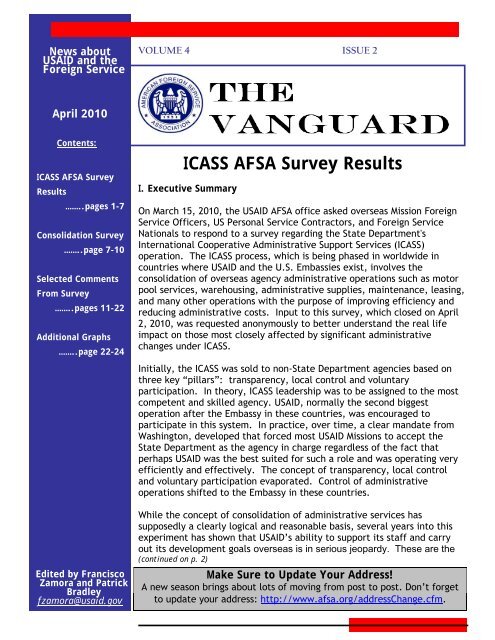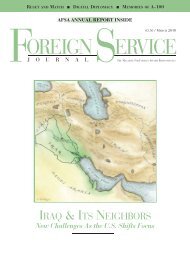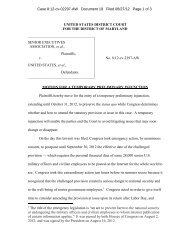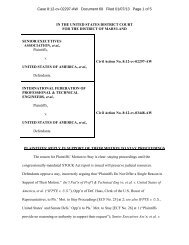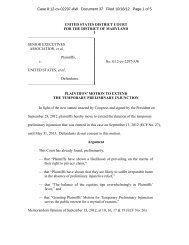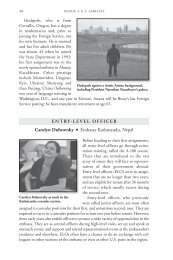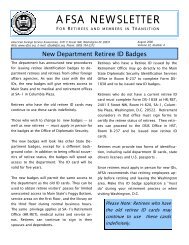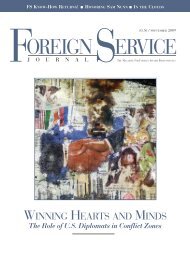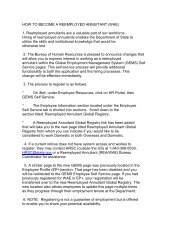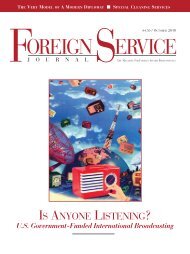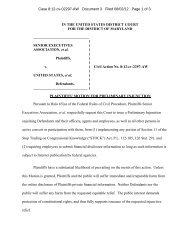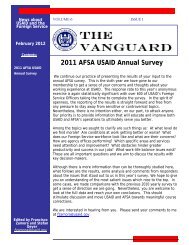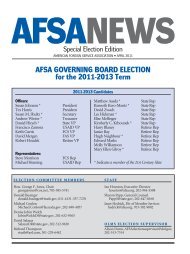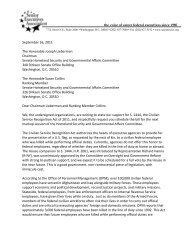ICASS AFSA Survey Results - American Foreign Service Association
ICASS AFSA Survey Results - American Foreign Service Association
ICASS AFSA Survey Results - American Foreign Service Association
You also want an ePaper? Increase the reach of your titles
YUMPU automatically turns print PDFs into web optimized ePapers that Google loves.
News aboutUSAID and the<strong>Foreign</strong> <strong>Service</strong>VOLUME 4 ISSUE 2April 2010Contents:<strong>ICASS</strong> <strong>AFSA</strong> <strong>Survey</strong><strong>Results</strong>……..pages 1-7Consolidation <strong>Survey</strong>……..page 7-10Selected CommentsFrom <strong>Survey</strong>……..pages 11-22Additional Graphs……..page 22-24Edited by FranciscoZamora and PatrickBradleyfzamora@usaid.gov<strong>ICASS</strong> <strong>AFSA</strong> <strong>Survey</strong> <strong>Results</strong>I. Executive SummaryOn March 15, 2010, the USAID <strong>AFSA</strong> office asked overseas Mission <strong>Foreign</strong><strong>Service</strong> Officers, US Personal <strong>Service</strong> Contractors, and <strong>Foreign</strong> <strong>Service</strong>Nationals to respond to a survey regarding the State Department'sInternational Cooperative Administrative Support <strong>Service</strong>s (<strong>ICASS</strong>)operation. The <strong>ICASS</strong> process, which is being phased in worldwide incountries where USAID and the U.S. Embassies exist, involves theconsolidation of overseas agency administrative operations such as motorpool services, warehousing, administrative supplies, maintenance, leasing,and many other operations with the purpose of improving efficiency andreducing administrative costs. Input to this survey, which closed on April2, 2010, was requested anonymously to better understand the real lifeimpact on those most closely affected by significant administrativechanges under <strong>ICASS</strong>.Initially, the <strong>ICASS</strong> was sold to non-State Department agencies based onthree key “pillars”: transparency, local control and voluntaryparticipation. In theory, <strong>ICASS</strong> leadership was to be assigned to the mostcompetent and skilled agency. USAID, normally the second biggestoperation after the Embassy in these countries, was encouraged toparticipate in this system. In practice, over time, a clear mandate fromWashington, developed that forced most USAID Missions to accept theState Department as the agency in charge regardless of the fact thatperhaps USAID was the best suited for such a role and was operating veryefficiently and effectively. The concept of transparency, local controland voluntary participation evaporated. Control of administrativeoperations shifted to the Embassy in these countries.While the concept of consolidation of administrative services hassupposedly a clearly logical and reasonable basis, several years into thisexperiment has shown that USAID’s ability to support its staff and carryout its development goals overseas is in serious jeopardy. These are the(continued on p. 2)Make Sure to Update Your Address!A new season brings about lots of moving from post to post. Don’t forgetto update your address: http://www.afsa.org/addressChange.cfm.
(continued on p. 3)The impact on quality and quantity of services in posts which had consolidated showed adefinite decline as 67% of respondents complained about this. While one of the reasons for<strong>ICASS</strong> was to save money, in the opinion of 49% of the responders, they believed that costshad actually increased. Only 5% of them think costs had been reduced. Whether or notthis is the case, it calls for a serious independent review to find the facts. Someresponders mentioned that the Embassy counterparts have resisted questioning regardingcosts factors.The ability to get work done quickly, efficiently, and effectively is another major tenet ofa consolidation of services but we find that the responders stated the opposite. Only 7%thought this had occurred while the rest of the employees or 93% stated that work abilityhad declined, remained the same or they did not know. So, even if costs savings could beproved, it does not necessarily follow that the work is being done efficiently noreffectively. In a related question, only 6% stated that work had become easier while asubstantial number 62% said it had become harder and more stressful. Not surprisingly,61% reported harmful effects to their morale. Such a situation also affected relationshipswith Embassy personnel because in 52% of these employees they reported an increase infriction between these two groups.III. AnalysisAs stated above, the justification for consolidating administrative services seemed logicaland smart, on the surface. It was believed that Economies of Scale would result fromreducing duplication. However, in practice the consolidation has created unanticipatedconsequences and can be attributed to the fact that the State Department and USAID comefrom two different work cultures with very different skill sets. In simple terms, State
officers are collectors of information who report information up the chain of command toWashington. While they meet with their country government counterparts mostly theyremain in the major cities. On the other hand, USAID employees overseas are technicalspecialists who design, implement and monitor projects country wide. Their meetings withforeign country counterparts and program implementers are carried out frequently andinvolve close technical negotiations.The categories of concern listed below address the areas where consolidation under <strong>ICASS</strong>has become problematic:Transportation <strong>Service</strong>sThe most often reported complaint at all Missions is the sharp negative impact caused bythe absorption of the motor pool into the Embassy. Use of a vehicle is crucial to the job ofUSAID employees because a great part of their work involves site visits to the field andconstant contact with in-country officials. As stated above, the nature of USAID'soperations are significantly different from State's because USAID is implementing technicalassistance programs that need different sets of skills and human resources. This survey hasshown that in almost all cases, priority for vehicle use had shifted to Embassy personnel.Dispatchers and drivers were no longer responsive to USAID employee needs as before.The result is an increase in missed or late appointments with counterparts, poor vehiclemaintenance issues, frustration, and wasted time trying to arrange for vehicle use. USAIDstaff is in many cases reduced to using local taxi services which are less safe and timeconsuming. Embassy drivers are less knowledgeable about USAID work sites and are moreresponsive to the perceived higher authority of the Embassy FSOs versus USAID FSOs.Under these circumstances, the job of the USAID employee becomes even more difficult.Some responders mentioned that the relationships with government had become straineddue to the unreliability of USAID personnel in attending meetings.Out of country travel has also become more difficult for USAID FSOs resulting from theconsolidation of travel services under one Travel Agency. The differing rules andregulations between State and USAID cause many errors for travel agents which result in
major problems for USAID employees. The system worked better when USAID had its ownTravel Agency.Building, Warehouse and Residence OperationsRespondents state that there has been a sharp decrease in maintenance quality, reliabilityand basic fairness with the switch to the <strong>ICASS</strong> system. USAID staff end up spending anenormous amount of time in checking of vouchers and services due to an increase ininappropriate billings and mistakes. Priority for services is skewed towards Embassy staffneeds to the detriment of USAID employees. One reason can be explained by the practiceof the Embassies to place Junior State FSOs in positions under <strong>ICASS</strong> where they have notraining or capacity to carry it out. These FSOs are frequently trainees who leave afteronly two years to be replaced by another set of trainees whose career goals are notadministrative services. In contrast, USAID Executive Officers are career specialists inadministration and like most USAID officers, commonly stay for two full two year tours intheir country of assignment.Another common complaint which results when <strong>ICASS</strong> takes over building, warehouse andresidence operations is that USAID staff gets the leftovers, poorer maintenance service andthe smaller working spaces compared to Embassy personnel. Poor customer service andoutright hostility is now being reported by USAID personnel and the FSO must now worryabout the comfort and safety of his family in foreign settings. Some of the time, they areeven forced to pay for services out of their own pockets in order to avoid the hassle anddelays dealing with <strong>ICASS</strong> supported services.The <strong>Foreign</strong> <strong>Service</strong> National (FSN) ImpactAt overseas USAID Missions, one of our most valuable assets is the FSN, who is typically avery specialized individual in the areas of development or administration possessingsignificantly different skills from State Department FSNs. USAID FSNs are empowered tooperate at a high level of independence and authority due to the specialized nature oftheir skills which in many cases matches those of the USAID <strong>American</strong> staff. USAID FSNpositions are highly competitive and only the best are hired. As a result, USAID FSNscommand a higher level of salary than State FSNs and are valued by other international aidorganizations who compete with us to hire them.A particularly damaging influence on USAID's work is the overwhelming preference forEmbassy Human Resources offices to keep FSN grades artificially lower than USAID needs.Because of its preference for US employees, State makes minimal use of professional FSNsat the higher grades, but nevertheless, does not believe other agencies really need FSNsthat perform at the higher professional grade levels. Therefore, when the Embassy takesover FSN hiring and management, USAID FSNs are not treated fairly or compensatedappropriately. This creates morale problems and frequent turnover making us all lessproductive.Also, whereas the USAID Executive Officer, with a team of FSNs, would typically manageall areas such as Human Resources, General <strong>Service</strong>s, Information Technology, andProcurement, the Embassy tends to hire an expensive <strong>American</strong> national to oversee eacharea. Compared to US employees, USAID FSNs are very economical and the budget sufferswhen they are replaced by high costs U.S. personnel when <strong>ICASS</strong> takes over services.Computer Systems
There has been a push by State to replace USAID computer systems with its own systemcalled Open Net. Practical experience has shown that the State system is poorly designedto meet the very different needs of USAID Missions. Those who have been forced to adoptthe Open Net system have reported enormous problems. Open Net has sufficientlychanged the efficiency of network. It's reportedly much slower and many of critical sitesand connections needed by USAID employees are no longer available. Even email traffichas been slowed down significantly.Planning for the conversion has been poor. For example, one employee at one Mission wasasked to provide input on applications on USAID’s network, AIDNET, that would be requiredon OpenNet only to find out that when the transition was done, most of the applicationswere not available or allowed. In addition, computers that were bought for AIDNET weredetermined to be noncompliant with OpenNet thereby forcing USAID to dispose of this newequipment. In another case, Word 2007 which is used by OpenNet is incompatible with thecurrent Word 2003 word processor which is the approved program at USAID. The wholeplan for conversion has caused widespread frustration, wasted time and resources.State-USAID RelationshipsIn countries where the consolidation has taken place, the tension between Embassy andUSAID staff has increased. USAID employees feel ignored and upset at the treatment theyhave received from their State counterparts. There is no longer a team concept in thesecountries and Ambassadors and DCMs do not seem supportive of their complaints. Althougheach country has a Joint Management Council under <strong>ICASS</strong>, their one vote is not enough tomake changes to decisions which are hurting USAID. A large amount of USAID funds go tosubsidize Embassy operations and USAID staff does not believe they are getting theirmoney’s worth. USAID executive officers are spending an inordinate amount of timechecking and objecting to the poor support, equipment and services provided by theEmbassy. It is an unequal relationship and the situation is deteriorating.
IV. Conclusion and Recommendation:The obvious conclusion we can make based on the results of this survey is that there IS aproblem. Without question, development programs are being harmed by the forcibleconsolidation. There is also a clash of cultures between State and USAID. It is evenpossible that State employees are feeling the stress of taking on more and incompatibleactivities they would prefer that USAID continue administering. The <strong>ICASS</strong> implementationwas not collaborative and there is a very good possibility that costs have increased andthat productivity has decreased.One has to ask what was the problem that <strong>ICASS</strong> was aiming to fix? USAID administrativeservices were not broken and yet they were targeted to be FIXED. <strong>ICASS</strong> principles werenot followed and the end result has been widespread dissatisfaction and even anger.While there may be some administrative services which make sense to combine, this canbe a highly individual country team decision and should never be forced on any oneMission.The best solution is to stop the consolidation, do a scientific review, audit or investigationby a neutral party, and return back to USAID control those services whose "consolidation" iscausing financial or operational harm. We have a new Administration at USAID which islooking at bringing us back to being the world's premier development agency. These willbe empty words, unless we listen to the needs of our staff. Staying the course will only bedetrimental to our mission.Francisco J. Zamora
<strong>AFSA</strong> Vice President USAIDConsolidation <strong>Survey</strong>
Selected Comments From <strong>Survey</strong>USAID Management is not supporting the field when it has <strong>ICASS</strong> issues. It does not support efforts to withdraw form <strong>ICASS</strong>when services are inadequate.In the push to consolidate as much as possible, the logic of consolidating some services was overlooked. The message was, if itis on the list, we must try our darnedest to consolidate. Some services made sense and those are working well. Others did not(and still do not) make sense. These are the ones that constantly give us problems and cause us (and State) hours of time (acost that is not captured). Overall, I do not believe this has saved the USG money. It has given <strong>ICASS</strong> another "locked in"client (in addition to State) while all other agencies at post can opt in or out of services.Since consolidation, we have had to continue to employ three people to followup with <strong>ICASS</strong> service requests from USAIDcustomers.If at the long run a merge is what is being pursued and the consolidation is only a step forward, there's nothing to say but ifthe process is being studied, it is cheaper and more efficient if each agency manages their own needs.The poor services and sometime hostile attitude of <strong>ICASS</strong> staff (mostly the <strong>American</strong> staff) make dealings with them quietunpleasant. USAID is at a disadvantage as the Ambassadors and DCMs don't ever want to address problems with <strong>ICASS</strong>. I'm
not sure why, other than they get into a "protecting their own" mentality and so will always support the <strong>ICASS</strong> staff and offerlittle or no support to the "outsiders"-- USAID staff. The <strong>ICASS</strong> surveys are a joke. People can fill out the surveys as manytimes as they want, so the <strong>ICASS</strong> staff fill out the surveys numerous times in order to make sure they get positive input. I haveno confidence that they survey will result in any changes as I honestly don't think the majority of State staff care enough. Theytake the attitude that they are in charge and USAID is supposed to just keep quiet.The idea of saving costs and eliminating duplication has universal appeal, but <strong>ICASS</strong> is premised on and unequal partnership inwhich USAID subsidizes State Department functions.Motorpool consolidation was a mess as well. As a USAID employee it is critical to get out to project sites and partner offices.However, after consolidation in attempting to visit a partner the motor pool driver (formally embassy driver) did not knowwhere the partner was and I arrived late for meetings. When we called them back for pick up we waited for an hour and thencalled again only to find out that the driver on duty did not know where the partner was. This is unacceptable given that I amworking in a war zone. There are many more stories such as these as a result of poorly planned consolidation.The arrogance of the Open Net consolidation in Kabul and the disruption it caused is offensive to everyone who is sacrificing tobe here to work for national goals and not to score administrative coups.Consolidation is merely another name for State's subordination of USAID, in this case, on the administrative rather than theprogrammatic or budgetary side.<strong>ICASS</strong> consolidation of IT systems is a horrible idea and should be given considerable consideration by the USAID Administratorbefore other countries areConsolidation has only worked at Post because we retained our EXO and they serve as an interface between us and theEmbassy on issues, particularly regarding housing and work orders. Without this, it'd be almost impossible to get anythingdone on your house. Currently if I have almost any interaction with the Embassy personnel on housing issues, whether it's GSOor Maintenance, it's unpleasant and I immediately turn it over to EXO to 'massage.' This is uncalled for and makes forunpleasant working relationships.A true cost benefit analysis needs to be done for consolidation. The idea that the only service provider should be the Dept ofState is misguided--it may not actually save money or provide a better service. I understand that at some posts, USAID hasopted out of motorpool all together and uses taxis. That a commercial service is better than one provided by USG staff is sad.Consolidation in an active war zone, during the largest increase of human and financial resources being funneled through theagency in decades, has been an unparalleled negative influence on morale, on capacity to operate and on intended results.While integration should, in theory, contribute to efficiencies on the operational side, the reality is that <strong>ICASS</strong> managementthrough DOS is not a neutral "honest broker".Policies need to be standardized. We can no longer get an embassy car from home to a meeting (first thing in the morning) orfrom a late meeting direct home due to a policy by the Management office. This increases the costs and frustrates people.OpenNet has slowed and tremendously complicated our IT systems. Please ensure that the Ambassador-level developmentsupervision model is removed from all post in the world. It has absolutely no value-add; it actually adds massive layers ofbureaucracy and slows / complicates progress. Isn't it AID's mandate to lead USG development efforts??? And where did ourbudgeting / HR responsibilities go? Please get this back. Who is informing Congress of these injustices? Anyone listening?A State argument for consolidation was that it would save money by having the same number of people manage administrativeservices. Now however, they have used the argument that since there are more people to serve, more <strong>American</strong> staff areneeded -- significantly increasing overall administrative costs.I think that the major difference is that at post one entity is a diplomatic mission which requires staff to simply follow rules andthe other is a development aid agency which requires staff to be innovative, individually accountable, to make decisions and todeliver results, produce tangible and result orientated reports etc., and to be accountable for money spent (COTR, AOTR).It is ridiculous that each mission that consolidates is expected to re-invent the wheel in terms of how to execute the actualconsolidation of services. The Joint Management Council seems to offer no assistance and has no best practices to share evenafter going through many of these worldwide.As a taxpayer I am appalled that the United States has gone this route. We have a huge deficit and are only contributing to itwith sub-par but highly expensive services. Need to find a way for USAID to bow out of more services.We have been asking for a "real" audit of <strong>ICASS</strong> for years (perhaps by GAO. It is obvious that costs have increased andefficiency has decreased since the forced consolidation under <strong>ICASS</strong>. So what is the problem with moving forward with anaudit? Doesn't the <strong>American</strong> taxpayer deserve to know how their tax dollars are being used? It's surprising to me that nobodyhas gone to the Washington Post or elsewhere to "blow the whistle" on the <strong>ICASS</strong> sham.
There should have been physical inspections carried out before and after consolidation. A team from Washington should comeand make their observations.Just this: We are told over and over again that we must do a cost benefit analysis before consolidating and that we should beable to show a savings to the US government, when in reality nobody really cares what the results of any analysis shows--weare going to consolidate anyway. I think the USG should do things that make sense instead of forcing an agenda that is notalways practical.USAID is treated by State as a second class group. In most cases we are at higher grades yet we are not given housing orservices commensurate with where we are at. <strong>ICASS</strong> does not save money because there is no watchdog overseeing State likewith USAID. State also does not have very qualified persons running <strong>ICASS</strong>>Consolidation worked reasonably well at my post. Where there may have been a deterioration in services, this applied equallyto USAID, State and other agencies.Consolidation should not be harried. Start with few departments at a time and observe how it is performing to avoid makingmistakes. Consolidation of programs should be the last activity to undertake. I would recommend that we tread carefully inconsolidating programs because the majority of efforts in this activity have proved to be difficult with nasty results.We have been fortunate here and credit goes to Embassy Tel Aviv management counselor and staff who worked with us in acollaborative, constructive manner. We've heard horror stories from other missions. Embassy management counselors andAmbassadors should be instructed to implement consolidation in a collaborative manner and not play the 10,000 lb gorilla.We are forced to follow State directives, but USAID has terrible access to STATE internet sites, e.g., not possible from post forUSAID staff to access State Med website on USAID computer system. A password prompt appears, but our passwords are notaccepted.Somebody on a high level needs to stand up to State and say enough is enough. If consolidation is going to continue, show usevidence that a) it saves money for USAID; and b) it doesn't decrease the quality of services for USAID personnel. If USAID'scosts go up, even if somehow State's costs go down, USAID is effectively subsidizing services to State and perhaps otheragencies.Consolidation will in a long run benefits the government by reducing cost of the direct hiresAmbassador at Post is derisive of USAID concerns in joint meetings.There should be an Audit or GAO study of consolidation under <strong>ICASS</strong>. How has foreign assistance faired under sharedadministrative services? Economic questions need to be asked: Have we reached a point of diminishing returns? What is theideal 'firm size' with regard to <strong>ICASS</strong> service units? Is it possible that as <strong>ICASS</strong> units have grown, we have reached a pointwhere "diseconomies of scale" have set in? Here is an metaphor/anecdote: I live in an apartment building - and am on goodterms with my neighbor. My neighbor and I both have a fridge, a stove and a table. We also both live on a budget. So whydon't we just save the money by eliminating my kitchen or my neighbor's and just eat all our meals together? The answer isobvious; practically, while friends, we are different. We don't follow the same schedule or like exactly the same foods. I amvegetarian, she is Jewish. We are two houses, not one. We are neighbors, not family. We will remain better friends if we fix ourmeals separately. USAID is a government endeavor distinct from Diplomacy, and distinct from Defense. In the interests of notimpeding foreign assistance goals, USAID needs to be cut a little more slack than the rigid consolidation mandates JMC hasordained.The consolidation causes much more work because of the oversight to ensure service is provided and to monitor expenditures.Also, it seems we are put on the defensive at post because every time a State person comes prowling around, we wonder whatwill be taken next. We don't like to provide information as they will use it against us during some hostile takeover scenario. Forexample Embassy HR openly talk to my FSNs about taking over HR. This is very bad for morale and I have to keep remindingeveryone about JMC directives and that HR recruitment doesn't mean HR. Further, I would like to thank all the staff inUSAID/Washington with a backbone to stand up to the State dept folks in their attempts to inch by inch swallow us. This has tobe a horrible job, but we thank you for this. As Dr. Shah said - we are obligated to dissent.We need to organize training sessions and working groups in order to make sure that both service providers and customers hasthe same understanding like others.Now USAID is at the mercy of the whims of the service provider. When good people are in place, it's okay. When they aren't itcan make things very unpleasant and difficult.USAID must be seen as an equal partner with STATE. This is a hostile merger!USAID pays more, gets less under consolidation. It is also further undermining our ability to manage or control our resources inways that best benefit our foreign assistance objectives.
My experience as an EXO at other posts (I'm in a different backstop now) is that competition between agencies actually keptcost to the taxpayer down.Administrator Shah should request a moratorium on consolidation until more thorough and transparent analysis is done on theexperience to date.The idea of consolidation is fine, but the implementation has been really badly handled with all of the decision-making authorityapparently being given to State --no matter how hard the USAID post management fight for retaining some authorities itseems that AID/W doesn't back them up.<strong>ICASS</strong> services are inefficient and customer service providers can not accomodate USAID's different needs due to USAID'sdifferent objectives. USAID implements and manages projects. State Department meets with host government officials andwrites cables. Administrative services to accommodate these two very different objectives need to be flexible. State's culture isone of inflexibility and demanding that USAID adapts to their standards without even making an attempt to adapt to USAID'sneeds. The <strong>ICASS</strong> council will never function adequately in any post to be able to create positive change. The best solution is toallow agencies to find the lowest cost service that meets the needs of the agency. Which is what <strong>ICASS</strong> was suppose toencourage by allowing agencies to opt out of <strong>ICASS</strong> services, as services were voluntary - per the FAM. By requiring USAID touse these services, USAID will no longer receive services that are efficient or meet the needs of the agency. Why doesn't theFAM apply to USAID where the FAM states that <strong>ICASS</strong> services are voluntary? These rules apply to all other agencies at post,and indeed, most other agencies opt out as they have found lower cost solutions that better meet their needs.This is a logical move as an armchair notion, but needs looking into the details. Who is the best and low cost provider and<strong>ICASS</strong> cost containment seems not to have been considered. Each year <strong>ICASS</strong> takes more & more out of our limited OE &discretionary resources; this is not sustainable.I feel like USAID is not highly represented at meetings where the consolidation issues are discussed, and thus, they become aState driven exercise, and "we" agree to whatever they come up with.It is a good initiative, but State (motor pool) does not understand the concept of serving a customer.When in need of a specific service USAID is neglected often, and priority is given to State. Supervisors from USAID often haveto intervene multiple times(contact State),to get a service done.My USAID mission management has not been transparent with information regarding consolidation. Senior staff at my missionare completely in the dark, and rumors are flying among the FSN staff. Our management has not managed the transition well,and it is causing stress and unease among staff. this is entirely USAID's fault.Why it may be appropriate to consolidate cashiering and recruitment, I think that warehouse management, asset managementand motor pool should be for each agency to manage.Quality of <strong>Service</strong> - GSO does not respond to inquiries about quality of service. The Management Officer considers any questionregarding expenditure rates or quality of service as opposition to consolidation itself. Housing - State requires USAID to pay forany improvements on a property (leased or government owned), but when the house is assigned again State will assign it totheir own. Thus there is a disincentive to improve properties which effects employee morale and quality of life. The HousingBoard composition was changed without consultation. A memo was drafted and approved by the DCM without any consultationwith the participating agencies. The Management Officer insists on making changes to processes even when they are inviolation of the State Department's own DOSAR. When this violation problem is raised, USAID is accused of sabotaging theconsolidation policy. State seems oblivious to the fact that their best and brightest do not go to Posts that have a USAIDMission. Therefore, the quality of the USDH staff is usually a downgrade when it transitions from USAID to State. Not apleasant fact to acknowledge but a fact nonetheless. Also notable, in the past, a USAID officer could appeal an EXO's decisionto the Mission Director, now such an appeal has to go to the DCM because the GSO reports to the Management Officer who is apeer of the Mission Director. Frankly, if State wants a constructive suggestion, they should assign staff to USAID to do thework. It would still be consolidation (they get the budget funding) but the team would report to the Mission Director or her/hisdesignee. At least then there would be a way to demand improved services without making it an interagency tussle involvingthe DCM.the system will never be seen as equitable if one entity controls the system on behalf of the other--especially when the entitiesare separated by an entire city and it is not possible to know or dialog with your "service providers". this inequity--whetherperceived or real--puts us as odds with our colleagues at State, as it feels as though we are in competition with one anotherrather than collaborating. This is bad for morale of any kind. My motto is "if it ain't broke, don't fix it"--i don't think thatUSAID's systems are broken, and fear that things will continue to get worse with further fixing (consolidation).USAID/Washington has either not taken or not communicated a strong position on the issue of consolidation to the field, or toDoS. Passing on a few ambiguous and poorly written cables does not constitute a strong position. Until early 2009, EXOs wereencouraged to "push back" or to "do only what makes sense", while negotiations were taking place in Washington toconsolidate Tier 3 missions that are not even co-located. This wasted tremendous amounts of good will. At the same time, themessage that consolidation is limited only to listed admin services was not defended effectively, allowing some Embassies toexperience a bit of "consolidation creep" into programmatic areas. Mission Directors, Technical Office Team Leaders and EXOs
are being rendered less relevant at the mission level as USAID became less of an independent agency and more a ward of theDepartment of State. The "ownership" we had developed for our areas of responsibility and to the countries we serve in isbeing replaced with a less urgent, but more stressful, need to comply with the directives of non-development professionals(COM and DCM) and to complete and submit a myriad of reports. Our DoS colleagues have clearly taken advantage of the factthat USAID has been a weakened agency and the attitude shows in their lack of respect for our agency, our leadership and ourwork. Please, if USAID is to become another office of the DoS, please say so right now. USAID FSOs will accept the role and willposition ourselves to be effective in such an organization. If not, let's take a stance and get on with it!<strong>Service</strong> standards have declined and the ATTITUDE of the <strong>ICASS</strong> staff is awful. In general, they have no service mentality andare insulted by the term "service provider." Many are extremely unpleasant to work with. Those who try to be helpful and make<strong>ICASS</strong> work are soon "reigned in" by the <strong>ICASS</strong> staff. There have been attempts at more than one Mission where I've workwhere the <strong>ICASS</strong> staff have attempted to improperly charge costs to <strong>ICASS</strong> in order to get USAID to pay for things that weshouldn't. USAID staff end up spending an enormous amount of time in oversight of vouchers, services, etc. I don't think we'vesaved money -- now rather than managing quality services, we're an oversight body constantly having to watch for decreasesin services, follow-up on service complaints, inappropriate billing and attempts to take over more of USAID's operations. In onepost, the <strong>ICASS</strong> staff were inappropriately using business class even on short flights and when this was reported no action wastaken -- in fact one of the officers in charge was nominated for an award. If you were to ask for specific examples from thefield, you could write volumes.After one month at post I still do not have normal computer access through Open Net. Less frequent travel to meetcounterparts. Decrease in quality of housing (at greater cost, I am told).<strong>Service</strong>s are provided first and at a higher quality to State Department Employees. I am at my second <strong>ICASS</strong> consolidated postand this was the case at each location. Also, the proportion of costs sunk do not equal the service percentage given - at mycurrent post we pay 40% of Motor pool and vehicles provided - but cannot get out to visit projects because of Embassy visitorsand priorities.Open Net has sufficiently changed the efficiency of network. It's much slower and many of our sites and connections are nolonger available.Loss of ability to adequately support field staff. Loss of aidNET has been disastrous. A DOS power play for administrativeprimacy that ignores the operational reality of multiple <strong>Foreign</strong> Affairs agencies.We now can't get cars most of the time, or are told to take a cab, which is charged directly to USAID, not to <strong>ICASS</strong>. So it hasdecreased efficiency, made my job harder, and increased costs.They use expensive inexperienced <strong>American</strong> personnel, who turn over every two years, to supervise work that an experiencedFSN is capable of doing and who will be at Post for years. State does not operate with a customer service state of mind. Theyare focused on the Ambassador only, while USAID is focused on development.Our NEC will have a power bill of over $1M per year which is more than 5X what we currently pay. Also, since the embassyinsists on using <strong>American</strong>s to manage IT, HR, maintenance and other basic support services, the cost of these services is waytoo high. Finally, the lack of forward planning on building space needs puts constraints on our ability to grow or adjust.much higher costs, far lower service - basic work orders takes 3-4 times as long or are simply never done. Dual standard forleased vs. owned housing which greatly disadvantages those in leased houses and boosts costs tremendously for USAID. Totalloss of cost control and strong-arming by the Embassy to accept more USDH who are far more expensive and actuallycontribute little.(1) Increased cost for services; (2) Increased conflict between USAID and the Embassy (USAID is being treated as an inferiorpartner); (3) Lowest morale levels ever, especially for those who were consolidated; (4) Increased waste of facilities; i.e. theformerly USAID Warehouse has been run down; there is very little care for it and it is as if it is not a USG property; (5)Increased staffing levels (more and more staff are being hired yet the impact is not seen); (6) Inferior products are beingpurchased; (7) Increased monitoring required to monitor payment vouchers, etc. (8) Lack of transparency on how propertywas supposed to be marked under the consolidation; etc, etc.Example - FSN personnel...State has no idea how USAID uses FSN personnel. Many of our FSN's are high grade and extremelyqualified persons, in some cases they have more experience that State personnel. The people at State grading our personnelrefuse, simply refuse, despite the CAJE system to grade them high. (Yes, CAJE can be manipulated) It causes problems forUSAID with retention of FSN staff. I have seen that the majority State personnel treat FSN personnel like they are their maids.FSN personnel at USAID are treated as partners. State should NOT be doing our cajing of FSN.Poor customer service (from State and contractors), providers that are not accountable to AID in any way, poorly managedcontracts where problems are not addressed, services that don't meet our needs, no way to complain/resolve problems. Forexample - our new travel agent is so poor that we often have to call airlines ourselves to make our own reservations or resolveproblems that the travel agent has created. This is after wasting significant amounts of time trying to get the travel agent toprovide the service they are supposed to be providing to us (that we are paying for!). Official travel is a major part of our jobsand essential to our role in project monitoring - we've even had to cancel trips because travel arrangements weren't made in
time. There seems to be no official way to seek resolve on this. Also, contractors and service providers see State as their mainclient and so prioritize work for them (travel agent, housing repairs, etc), leaving USAID to the last.Costs go up for USAID and quality of service goes down. Supposed cost savings are illusory and based on an assumption thatconsolidation equals efficiency. There appears to be no empirical basis for this conclusion and a lot of evidence pointing in theother direction. What cannot be argued, is that on quality of life issues -- particularly housing and GSO -- consolidation hasbeen harmful to USAID and a huge blow to morale in every post I've seen. USAID simply gets swamped and outvoted on thehousing board. The smaller, efficient operation USAID ran previously gets swallowed up by a larger, less efficient bureaucracyat State, unresponsive to the needs of USAID personnel.Consolidation has been driven too hard from Washington. It has caused friction between State officers (anxious to fulfillconsolidation mandates in their EERs) and USAID officers who are skeptical at best, and prefer a measured and slow approach.The "Joint Management Council" is 'Joint' only in name. We know in the field that our Washington USAID colleagues make onlyforced token appearances at JMC discussions. That thing is run by State. I for one, at USAID, do not buy the arguments that'whole of government' benefits will instantly redound from consolidation. The dollar savings analyses which I have seen areunconvincingly small, weak and speculative at best, and fail to include the non-financial costs of consolidation to USAID.Examples of non-financial costs are that staff arriving at a new overseas post have - with great frequency under consolidatedhousing - to go to a hotel or a temporary apartment because their house is not ready. This impedes the household fromsettling in quickly at post. Another non-financial cost is all the rigmarole of trying to make <strong>ICASS</strong> respond to USAID's needs.<strong>ICASS</strong> <strong>Service</strong> Providers rarely show up and 'walk around' to talk with their USAID customers. We feel remote from <strong>ICASS</strong>. Wedo not hang out around the Embassy water cooler, and so have less contact with the people taking actions that matter to us.When USAID turned over its entire fleet and drivers to <strong>ICASS</strong> in the Caucuses, suddenly we were being direct charged for abunch of taxi rides we had not used under the USAID motor pool. Very weird. Very telling. Since <strong>ICASS</strong> is now getting all thisrevenue from its USAID invoices, it makes me wonder - as State/<strong>ICASS</strong> is relatively 'flush' now, if some gross misappropriationof funds is occurring. <strong>ICASS</strong> <strong>American</strong>s at our post have grown in number since USAID was consolidated. WhenUSAID ran those services, we had a greater proportion of FSNs doing the work. Now there are layers of <strong>ICASS</strong> <strong>American</strong>s overthe FSNs. The overall labor efficiency of this approach is seriously questionable. The FSNs in <strong>ICASS</strong> seem mostly to be theassistants of the <strong>ICASS</strong> <strong>American</strong>s, and not empowered enough to serve as customer service manager. It is a culturalcharacteristic of State. USAID still needs its EXOs, but the EXOs are marginalized with regard to shared services. They areunderutilized in part because <strong>ICASS</strong> took over the leasing, maintenance and warehouse management services that EXO used tosupervise among other duties.Poor service; for example, when VIPs come to town, which is often, the Motor Pool is totally occupied resulting in USAID staffrenting vehicles/drivers at our cost. After consolidation of the appliance pool for example, the original agreements of theconsolidated appliance pool were considered null and void. In one case, the FSN who came to repair an appliance told theUSAID resident that he would have to return to the warehouse to get a used appliance because the resident was a USAIDperson, and added if he was a State person he could give him a new appliance that he had in the truck! The workers on theground don't know the politics so they tell all. The ONLY time that we are treated respectfully is when it is <strong>ICASS</strong> survey time.Otherwise, we are dog poop.The disadvantage of consolidation is that service delivery (account payments) is excruciatingly slow. I can no longer be efficientand timely in work as it takes two to three MONTHS to get a copy of any payment processed by state. This has an adverseimpact on our Reconciling Items with Treasury.Delays of service delivery. Everything has to go all the way to high decision-makers. Internet sites are slow and delay requeststoo much regardless of the nature of the request/need.USAID pays more and gets less. There seems to be a presumption with State that services shall be provided by them, notUSAID, even though there is no demonstrable proof that State is the better or more cost-effective provider. Really, USAID hasa much larger fleet of vehicles and a smooth running motor pool. Why do we assume that State will do a better job? Why dowe no have to keep all of our vehicles parked at the Embassy (we are not collocated yet but motor pool is consolidated)? Itmakes no sense from a management perspective but is handled as an act of fiat. By giving State access to our vehicles, isn'tthat an illegal augmentation of their budget because USAID is now subsidizing States motor vehicle pool and paying for itthrough USAID's OE.Consolidation is impacting USAID's ability to get its job done. Staff can not visit projects due to lack of motor pooltransportation. USAID staff spend far more of their time dealing with administrative hassles that they did not have to deal withwhen USAID self provided services, impacting the time they can spend on implementing and managing projects. We are havingto de fund projects, that is take program dollars away from funding USAID's projects to pay for the higher costs of State'sadmin services when this money could have still been used to fund projects if USAID had continued providing the services.<strong>Service</strong> provision is based on State's objectives - having meetings and writing cables. There is no ability on the part of State toshift their way of thinking and accommodating another agency's objectives - managing and monitoring projects which are inthe field. State is not a flexible organization that can adapt its management style to accommodate another agency's objectives.DOD would have been a better service provider than State Department. Overall, the main disadvantage to the consolidation ofservices is that USAID's ability to get its work done - successfully develop and implement assistance projects -- will behindered, in some cases severely -- by a lack of administrative services. Perhaps some trade off would be worthwhile, butthese services almost always cost more.Consolidation is NOT eliminating duplication of services because for every denied request USAID has to go out and arrange for
its own services. We pay once for a service which we don't get from <strong>ICASS</strong> and a second time when paying a vendor we canprovide the service. Hence, we are also not reducing costs. They are increasing!!Costly. State hires USDH with high salaries and benefits. They almost never use FSNs except in the low paid jobs. The costs arephenomenal when you add one USDH.There is no check on expenditures. I review vouchers from GSO and the variations in costs for the same or similar work can beas much as 200% without explanation.The way consolidation is being accomplished completely ignores (or even has contempt for) the cultural differences betweenUSAID and DoS. USAID works with the people of our host countries. We empower them and include them in our organizationalstructure. They carry the institutional knowledge of our missions as <strong>American</strong>s come and go. <strong>ICASS</strong> uses LES as a labor sourceonly. There are 6 direct hire <strong>American</strong>s and 5 or 6 EFM <strong>American</strong>s who oversee the same administrative functions as one USDHEXO, one LES DEXO and four LES functional supervisors. Embassies add USDH staff to manage the additional support load that<strong>ICASS</strong> is taking on as USAID and CDC consolidate. These are often two year tours, where USAID USDH commit to four yeartours when possible. Often they use the GSO and A/GSO positions as training positions, so the entire mission suffers as thejunior officer has a "learning opportunity" before moving on to a consular or political office role. This is not a money savingmove and resulting reduced levels of service do not support the growth of the <strong>Foreign</strong> <strong>Service</strong>. TO SUMMARIZE: Higher cost,fewer and lower quality services, damaged post/agency morale.For USAID, increased cost for less services. On the cost side, just give us more funding and the problem is fixed; on theservices side, <strong>ICASS</strong> needs to think differently. State employees see this post as a hardship post -- so they put up with thedifficulties for two years and move on... but this type of post is one of the better places for USAID and where USAID employeeswill send most of their career. Prior to consolidation, USAID EXO staff specialized in this environment and made the extraeffort. Now, we are fighting for basics...Fewer and slower services. Longer waits for key supplies and equipment affecting productivity of staff. No longer able to holdkey official functions because "pool" of dishes and glasses is gone, meaning higher cost for each event.1) Embassy running joint motor pool is problematic as they do not fully understand USAID's constant need to be in the fieldmonitoring programs and attending meetings with counterparts and therefore needing available and dependabletransportation; 2) USAID location within the Embassy walls has created problems for counterparts coming to our offices due toincreased security and less than diplomatic treatment when clearing security, resulting in many counterparts, particularly hostgovernment, refusing to come to USAID offices; 3) housing pool is poorly run, with more expensive rents and lower levelEmbassy employees having better housing than higher level USAID employees; 4) maintenance at residence was slower andless customer-friendly; 5) FSNs at USAID are typically higher level and are better treated by USAID, and moving them toEmbassy roles was demoralizing for many (I'm sure you will hear this from the FSNs).There appear to be almost no mechanisms in place to ensure that services are provided in a cost effective manner. GSOs tendto use some old approaches without ever seriously considering ways of cutting costs. The <strong>ICASS</strong> Budget Process is a farce. The<strong>ICASS</strong> committee rarely meets. When they do, they rarely discuss budget matters. State sends untrained junior officers tohead up Budget and Finance Offices. Under these conditions it is impossible to obtain maximum value for the dollar. (1) Staterelies too much on expats and doesn't recruit enough senior FSNs to oversee facilities maintenance and GSO services. (2)Motor pool is poorly run and unresponsive to our needs. Rides are frequently late. (3) Procurement through the embassy isextremely slow and unreliable. (4) Housing for USAID is second rate. State has no incentive to provide USAID with qualityhousing. USAID has only one member on InterAgency Housing Committee even though we have far more employees. As such,our needs are poorly addressed. Maintaining USAID Office building is often viewed as a low priority. We can't even get ourwindows washed. Though State has a "greening diplomacy initiative", State GSO and Facilities Maintenance have not beeninstructed to identify "greener" ways of supporting USDH overseas. As such, our motor pool has only 4x4 vehicles even thoughfuel efficient sedans could easily be used in this country. No attempts have been made to replace diesel thirst generators withsolar panels and batteries. The <strong>ICASS</strong> Council Arrangement of providing each agency with one voting member is totally flawed.Most of the smaller agencies don't give a hoot whether or not State overcharges or operates in an inefficient manner. Becausethey've never seen an alternative (like we at USAID have), these <strong>ICASS</strong> members have no basis for comparison. Because theyhave busy professional lives, they aren't willing to invest any time into making <strong>ICASS</strong> function better. As a result, theBehemoth that is has become just stumbles forward.Housing is not available when arrive, repairs take much longer, workers show up at your house without warning and ID.Several times more than one set of workers have shown up for the same repair (none fixing it). I am losing my house after 6weeks because the lease won't be renewed. State didn't check with the landlord before I moved in so now I have to move.Motor pool is never available when we need it.Biggest problem is the people doing the work are all STATE people and they don't give one hoot about USAID people - we arenot on their screen so we get the worst services, last. Also STATE drivers do not normally go out of the capital city so they arecompletely lost when it comes to finding USAID sites.Poor service. None responsiveness to USAID needs. Worse vehicles are assigned to USAID. Worse housing in the housing poolgoes to USAID staff.
The biggest disadvantage has been the inability of the mission to get the staff resources it needs because of inadequate <strong>ICASS</strong>services to support growth. We are unable to get NSDD 38 approvals because <strong>ICASS</strong> can support the growth. This is creating ahuge vulnerability for the mission, as well as, negatively impacting staff morale and overall quality of life at post.The entire set-up disadvantages USAID's overseas operations administratively and programmatically. Not sure whose brainchildthis notion of consolidating functions for such diverse Agencies as USAID and STATE was, but it should not have left the "WhitePaper". Disadvantages run the gamut for USAID: Huge <strong>ICASS</strong> bill which depletes operational and program monies that werebest spent in the country as designated--to develop the country (economically, democratically, etc.) and the people (FSNs aswell as host government officials and others in country); lack of basic customer servicing--days/weeks go by without aresponse to critical residential, office building, procurement, general service (including Motor Pool) and other issues thatcompletely weaken morale and the ability to do one's job without worry/anxiety; incessant impossibility of dealing with abureaucracy like STATE with Washington-like requirements (mirroring U.S. locales) in an overseas location; high costs for the<strong>ICASS</strong> Bill and higher costs for USAID due to EXOs trying to do run-arounds and one-offs to meet basic customer needs thatthe <strong>ICASS</strong> framework simply can't or won't address (see bureaucracy above); dealing with a Management and/or General<strong>Service</strong>s Officer that has no idea that meeting customer needs and obtaining customer satisfaction is a large part ofmanagement success and something that they should actually strive for; getting the same to buy-in to the fact that USAIDtechnical and program officers really need to see programs in action which can be at any time outside of their scheduled MotorPool shuttles/runs; the notion that great customer servicing isn't something you do only for the AMBO or DCM, that otherpersonnel should also be considered; providing USAID with ample opportunity to comment on an increased bill/costs andactually seeking USAID's opinion/comment on the bill/costs; and, importantly, ensuring that FSNs are given the opportunity tocontribute to the Mission's success as any professional would like to contribute--basically, treating FSNs with professionalcourtesy, dignity and respect pre-, during and post- consolidation.The nature of USAID's operations and staff in the field are significantly different than the State's; USAID is implementingtechnical assistance programs that need different set of skills and human resources. USAID staff frequently has to travel to thefield, meet with host government officials on regular basis. Consolidating the motor pool added complications to USAID’s staff,in few cases trips were canceled or staff has to use other means of transportation. Regarding the staff, it is becoming reallyhard to maintain and attract local qualified technical expertise to USAID and USAID projects because USAID FSN’s salary scaleis linked to the state (non-technical) salary scale.Now instead of paying for services through OE, we pay via <strong>ICASS</strong>. When USAID managed the services, they were deliveredbecause the managers were responsive to USAID. Apparently State cannot manage their own services, and constantly complainabout the additional "burden" of <strong>ICASS</strong>-- we see nasty, insulting emails from State <strong>ICASS</strong> managers all the time who complainthat USAID is "micromanaging" when we attempt to get the services that we have contracted for.More expensive for USAID -- and arguably for the taxpayer once consolidated -- many posts will have created new positionsAFTER consolidated in order to maintain some semblance of customer service. Moreover, on an indirect level, services becomemore expensive -- several posts I have queried in the region now hole up new employees to post for weeks if not months inhotels at significant expense to the taxpayer -- or to the detriment of operating budgets for both State and USAID where themoney could have arguably been used for other things far more important and impactful. Quality of services -- for USAID, theyhave declined in many instances. And for State -- services have often declined as well given the additional workload. In anutshell -- particularly from the vantage point of MANY USAID Missions around the world including my own -- costs have risenalmost as dramatically as the quality of services have declined. Do the math -- it ain't good.Most importantly, the reduction in the capacity of USAID to fulfill its mission due to co-locating staff with the Embassy, whichmakes it more difficult to interact with the full range of people from various walks of life who do not feel comfortable visiting afortress; decline in quality of services for USAID; increased cost of services; and lowered morale due to State takeover of yetanother vital support to USAID staff. Many believe the next step is full absorption of USAID into State.- Increased cost of services - Reduction in USAID management and operational flexibility - Creates a "one-size-fits-all" modelof administrative support that does not always reflect USAID Operational requirements: Field trips, Webpass Post Personnel,procurement. - USAID frequently given only token input into the consolidation process - Loss of direct management control ofadministrative operations important to USAID. State/<strong>ICASS</strong> not responsive to needs of individual customers whether USAID orother agencies. - Budgets have not caught up with increased <strong>ICASS</strong> costs and growing USAID and State footprint: <strong>ICASS</strong>capacity limitations being used to justify the denial of NSDD-38 for USDH staff. - Negative morale impact among FSN stafftransferred to <strong>ICASS</strong> management - Larger <strong>ICASS</strong> bureaucracy results in a less flexible and responsive service providerState inability to provide customer service (and lack of interest in same). State incompetence (Q: Why do we have sharedhousing at all CPC posts? A: Because State underestimated housing requirements by 100% in both Afghanistan and Iraq.Pakistan, I'm not sure about.) Arrogance, overt political influence, and non-transparent State approach to making consolidationdecisions and providing administrative services.We have different objectives and ways of operating to achieve them. E.g. motor pool. They are hired to mainly travel tomeetings in the capital while USAID requires drivers to navigate communities and logistics in support of extended field visits toensure programs are achieving objectives.Increased cost because <strong>ICASS</strong> requires so many more <strong>American</strong>s vs. FSNs; Embassy motor pool doesn't understand USAIDmotor pool needs - need to travel to remote and uncomfortable places, need to be quickly responsive to motor pool requests ifthere are issues with projects; perception is that the embassy takes the best housing for its staff - the most convenient; having
Without question, the standard of services will dramatically decrease and our costs will dramatically increase. This is not aperspective, it is a fact. I am the EXO in a Regional Mission and have seen this played out in each country we have offices. Werecently have completed in depth "what if" financial scenarios, and have seen our <strong>ICASS</strong> bill double in one location, to obtainservices from <strong>ICASS</strong> that we currently self provide, with very little corresponding decrease in our internal (FSN staffing) costs.Another location will see our net costs to obtain the 13 mandated services under consolidation increase by over $600K! This iswith keeping our same staff to do their same job, except now we "buy" them back under <strong>ICASS</strong>. The morale of our staff iscrushed because they do not want to work for the Embassy, and they fear in the future there will be Reductions in Force (RIF)or that they may be overlooked for career advancement within the <strong>ICASS</strong> system because they are an "outsider". Others havelegitimate concerns that there will be two positions doing very similar jobs, and one of them will get demoted to a lowerposition. Others fear that USAID jobs are classified higher under CAJE because we empower our staff more, and that theirfuture jobs under <strong>ICASS</strong> will be less challenging and reCAJE'd at a lower grade.Morale is definitely lower Quality of Life is 75% lower, DOS has turned 1 bedroom apartments into 2 bedrooms, forcing peopleto double up - The importance of people at CPCs having their own space is severely underestimated.USAID is even more of a second priority in scheduling vehicles and getting maintenance work done. Paperwork to accessservices has gone up and it increases all the time. What could be done with one request (schedule a round trip in a vehicle)now requires two and takes twice as long to complete. Ditto for clearances for visitors; to clear visitors to the office hasbecome much more paperwork intense and the time limits are sometimes unrealistic. This has resulted in more meetings outside the Embassy, which means more use of vehicles and increased expense.More bureaucratic layers. House pool merging has dramatically reduced USAID's voice in housing assignments. Agencies with1-2 staff in the pool have the same vote as USAID with dozens of staff in the pool. This has resulted in often inappropriatehousing for family size and professional needs. <strong>Service</strong>s such as motor pool are organized around the needs of a diplomat anddo not adequately accommodate the needs of project oriented staff.USAID is not taken seriously...we lose control. One vote on <strong>ICASS</strong> board is not sufficient for an agency that represents overhalf the USG presence in country. Also leads to favoritism by agency which is EXTREMELY harmful to morale and interagencyrelationships. Fairness must be paramount but unfortunately, it's the second post where I see that it is not considered.Every thing. Project monitoring comes to a standstill, new officers are always late to meetings and the office because the motorpool does not have enough drivers or vehicles to pick them up. Work orders seems to get lost. It takes days to move workorders, get spare parts bought by USAID before the actual repair gets done. Embassy staff insists that we hire theirdependents and mature, experienced USAID staff were let go even though they were doing the same work that Embassy hasmanaged to get new people to fill. Telephone management is a night mare and travel services has come to a stand still.1. Housing: We are having a very difficult time adjusting to this new post largely due to the fact that our housing leaves muchto be desired. It is not up to the standards that a professional working with USAID should have. We are investing our time andfinancial resources to have the house and garden brought to the minimal standards. We have found that the leases are notwritten and negotiated to USAID's advantage which puts the agency at a large disadvantage when negotiating with ourlandlord. As a result, we found that the GSO office uses this limitation as an excuse and won't take necessary risks to work in amanner (i.e., modify leases)that benefits the agency.You pay more and get less. In a budget crisis world where everyone is trying to maximize their dollars and get more for less,USAID is the only entity worldwide that is lining up to pay extra for worse services. Our programs for needy beneficiaries areactually being defunded to pay for State's high cost/low quality <strong>ICASS</strong> operation and to subsidize the training of their juniorofficers. To add insult to injury, our staff are getting bullied, insulted and treated like dirt by the so-called "service provider".The State folks are absolutely aware of our powerlessness and they glory in it. This has been one of the most demoralizingthings I have experienced since joining the agency. The whole experience is horrible and the fact that most of our supposedleadership in Washington is not fighting for us and doesn't have the guts to say no to this travesty makes it even worse. Therehave been days that I have actually been unable to sleep at night, I have been so distressed, so upset, so morally outragedabout the wrong that is being done to our staff, our beneficiaries and our agency.The key difficulty stems from the fact that <strong>ICASS</strong> at this mission appears not be a complete consolidation. We need to be eithertotally separate or totally unified not some hybrid, hodgepodge, in-between -- which is what we are now. Here's an example toillustrate the issue: The embassy has set-up a one-stop Customer <strong>Service</strong> Center and requests, status checks, etc. are allonline through this center. However, the online connection is housed w/in the OpenNet system. USAID users do not haveaccess to OpenNet at their desks. We're in a 4 story building, have a staff of 200+ and there are 3 computers in the wholebuilding with OpenNet access. At present, we're suppose to email our office assistants, who email the CSC, who login to theOpenNet system to enter requests for service on our behalf. So, they say we've consolidated... but have we...?Because this consolidation process is seen and treated by State Department as a subordination of USAID, we drop to thebottom of every list. The local staff tend to direct their efforts toward their immediate supervisor - so rendering good service toAID staff is no longer a consideration. Motor pool is unresponsive, vehicle don't show up. We have had personnel abandoned ata Kabul visit for hours because they could not get a vehicle. The computers are messed up, the email is messed up, our accessto directories doesn't work. Emails from DC to me have taken days to come through - or they don't get here at all. We nolonger have access to EIMS. It took two days to get an ink replacement cartridge for our printer when we used to be able tojust walk down the hall. Processes aren't consolidated, they're doubled. Since all of our reporting must go through State, weare not free to express issues or difficulties and our needs and opinions are omitted. This was especially and startlingly so of
the OIG report on the Kabul Embassy.Bad housing, worst appliances assigned to USAID. Can't get a vehicle because state has priority. Fees are ridiculous and shouldbe illegal.There have been little to no benefits that I have experienced or heard about. USAID had a very good system prior to themerger and services have only decreased with the consolidation. For those executive officers that really tried to participate inthe spirit of saving money and developing a better, consolidated system - their proposals, ideas and plans were completelyshot down and ignored. Consolidation really meant that USAID was being consolidated into the State system. Now, USAID paysmore money for less service. There are many, many examples - supplying 40% of the vehicles to the pool yet still unable toget a car to conduct regular business and certainly not getting 40% of motor pool usage. Practically impossible to get simpleoffice supplies, etc. Positions/duties that used to be performed well and efficiently by local staff are now designated <strong>American</strong>only - increasing the costs of doing business. FSNs are less empowered to conduct their business, example: my administrativeassistance can no longer order supplies in the office without an '<strong>American</strong>s' signature. Having a warehouse that was bought andpaid for years ago by USAID and thus didn't really cost the agency anything - after consolidation USAID is now forced to payuser fees for the use of our own building.Significant decline in quality and dramatic increases in costs due to the fact that State insists on making extensive use of USDHstaff to do work that can be done with FSN staff at dramatically lower cost. Consolidation is basically a way to subsidize Stateoperations in a way that hides the cost of the subsidy by distributing it across other US Agencies. Also the culture at State is toprovide services according to State's perceived pecking order at post with State Officers having higher priority than those ofother Agencies. USAID staff in my 30 year experience is invariably at the bottom of this pecking order. An FS-01 officer atState will be seen by GSO staff as having higher priority than a USAID FS-01 officer. The customer feedback efforts institutedin recent years are an attempt to address this systematically, but don't provide the resolution needed to adequately highlightand counter this tendency. As a result, USAID pays more and receives less for many services provided through <strong>ICASS</strong>. Aparticularly damaging influence on USAID's work is the overwhelming preference for State HR staff to keep FSN grades muchlower than USAID needs. Because of it's preference for USDH officers, State makes minimal use of professional FSNs at thehigher grades, but nevertheless, does not believe other Agencies really need FSNs that perform at the higher professionalgrade levels.For moving inside the town to visit projects and participate in activities, we are fully or most of the time using taxis. This is avery big disadvantage, because taxi service is not well developed and always have problems with coming on time, getting tothe right address. Once, we had to use taxi service to get from the reception with obligatory participation. I was waiting 45minutes outside the building, at night, in cold, calling to the taxi service, and could not locate their car. Finally, when I taxicame for me, the driver mistakenly took the other passengers and I continued waiting. For me, the driving service has been adisaster since consolidation.Decision to transfer to OpenNet was not consultative - it was directed. Our mission (Kabul) was directed to transfer to OpenNetwithout a full transition plan or MOA in place. As a result, many issues were unresolved. We now have significant email delayswith AID/Washington and partners. We must access several applications remotely, including the bidding process. Cost isexpected to more than double.Embassy pushed this despite our voiced concerns over our ability to work closely with our external implementing partners.Forced onto State OpenNet and since our external partners have difficult time reaching us via email--can take up to two daysto get something through the system to us. I don't even know what I am not getting anymore since volume of emails coming infrom outside has been cut in half. Managing hundreds of millions in US taxpayer development assistance dollars beingcompromised so Embassy can get emails from US faster. Also, Embassy replaced the home internet that USAID had in place foryears and shared with Embassy for free since 2003--ours cost $300,000 per year for all of us combined--they replaced it withsystem that costs $3 million per year and has only HALF the bandwidth. Also--no one seems to be addressing the issue of us ofAID funds to consolidated services when AID funds restricted from use for police training, etc. If USAID AIR --now calledEmbassy Air (combined INL Air Wing and USAID Air) being used by State folks for free--and used for police training activities--isn't this illegal? No one will tell me if there is some waiver in place to deal with this.<strong>ICASS</strong> was an ill-thought out plan that HAS NOT made services better and HAS NOT created camaraderie between USAID andState.USAID has lost it's identity. It's as if we don't exist. More time now is spent on filling out forms to access services and now thatour computer systems is on Open Net, I can't access emails outside of this system. When our computers were part of AID Net,I could access email remotely, using my token, but now I can't. This hinders my ability to do my job because when I have totravel to the field/provinces, I can't access my emails through the State system, I have to wait until I return to the office. Thisdelay's my ability to be responsive if people need information.The old heads in USAID were very upset by not having the ability to control directly administrative resources. They were veryused to skirting regulations and crossing the line, esp. with motor pool (e.g., using motor pool vehicles for home to office andshopping trips.) Now they can't go that as easily.USAID staff are forced to use State systems, like E-services even if our computer systems are incompatible. The whole systemis State dominated and State's focus is on serving the needs of State people. USAID's needs are not a priority.
1. <strong>ICASS</strong> does not understand USAID's regulations and are not willing to learn. 2. EXO has to spend an extraordinary amountof time micro managing. For example, <strong>ICASS</strong> provides leasing and maintenance services. However, there is no feedbackmechanism or priority given to emergencies. USAID has to have one of its employee serve as the middle person to work withmaintenance to provide feedback to the employee. 3. Motor pool: <strong>ICASS</strong> drivers don't know USAID's project sites. In someposts, USAID had to enter into a separate contract for taxi services as 75% of USAID's motor pool requests are denied.Much higher costs, much lower service. State/<strong>ICASS</strong> is not accountable to its customers and has limited incentives to providebetter services. Also, State/<strong>ICASS</strong> personnel are not evaluated on their ability to provide better cost effective services to theircustomers. This results in an arrogant (in the sense that they refuse to respond to customer complaints or suggestions) andunaccountable service provider. Moreover, I have found that very few State/<strong>ICASS</strong> employees even fully understand the rulesof <strong>ICASS</strong>.Priorities of State led diplomacy will always trump development priorities. This will negatively affect our business model goingforward.Over burdened with inter-agency meetings- also known as USAID briefing State, USAID hardly derives any benefit from interagencymeetings, and they take up valuable project management time. We can no longer meet freely with partners/HCN/HostGovernment due to security/entrance restrictions at Embassy. Forced to work in depressing, soul-crushing embassy (giving uphistorical USAID building). <strong>ICASS</strong> is a joke- Motor pool is less reliable than a broken watch, Housing (and many of the other"cost saving elements" actually end up costing USAID much more, and are less suited to our needs, USAID does not enjoy aprivate space, the space we are provided does not meet our needs (not enough meeting rooms, insufficient computer space,not much room for expansion, no green space, etc). In short- I am not a fan, and in the future I shall only be bidding on Postswhere consolidation has NOT occurred.Motor pool is a significant challenge of consolidation. It is difficult to get a car - even when I have a confirmed online booking.This had a big impact on family morale when we first arrived as we had to walk everywhere or take less than safe taxis. Myspouse felt imprisoned. Yesterday, I was 1 hour late for a meeting as my confirmed car booking didn't show and it took 3phone calls to get the issue resolved. Additionally my admin. assistant complains about ordering supplies as it takes muchlonger than it used to.Both quality and quantity of services decline as a result of consolidation. My mission has consolidated motor pool, warehousing,maintenance and other services, but most of the times, you need to beg before getting a car, property management is nottransparent and we need to be on the watch out to ensure that our supplies are well managed, our offices are so dirty anddusty because the number of janitors allocated to us is so low to cover all the needs, residence occupants are alwayscomplaining about the services received, and above all, the State management persons are not very collaborative andcustomer focused so that there are always conflicts between state and the other client agencies.State does not have the ability to contract at out for services effectively. As a result, their costs for providing services aresignificantly higher. They also tend to favor State employees for services and housing over USAID staff.USAID staff are affected and USAID management does not have the ability to address issues independently. Unlike State andother agencies, USAID FSDH staff go from one hardship post to another so the quality of our lives over the course of our careerare affected by the services we receive at post, particularly related to housing, etc. State Dept staff and those of other agencieson the other hand serve part or all of their careers in non-hardship posts where the quality of embassy services are lessimportant from a quality of life perspective. The decline in services is greatly affecting USAID staff morale and efficiency. Thishas been little more than a way for State to subsidize its operations with USAID appropriated OE funding. The old separate wayof operating worked much better.The <strong>ICASS</strong> management of financial resources is questionable and needs to be addressed systematically. The StateManagement Office appeared to be less versed in procurement regulations attached to various Congressional accounts. Forexample, once <strong>ICASS</strong> took over the motor pool a new fleet of Toyota vehicles that did not meet Buy <strong>American</strong> rules werepurchase. The <strong>ICASS</strong> council could not obtain a transparent accounting of the funds expended from the Management Office.USAID Senior Officers were not treated with the respect one would expect for equally ranked State Officers (e.g. MissionDirector arrived at post without having a residence. The issue persisted for nearly one year.).USAID and State are not always co-located and in some regions, our staff is more involved in the field than State. Mere costeffectivenessis not adequate reason for consolidation if the quality of the service is reduced -- this is one of the primary edictsof Government Procurement in the first place! If we are unable to get transportation that we need to do our jobs and we'restruggling for "our share" of the resources because now we share them with State, our ability to do our jobs could besignificantly impacted.Stress - what is going to be consolidated next? Every time a State person comes snooping around (usually after hours) youhave to wonder what is next... Workload - though they take something over, USAID must still manage it to push for qualityservice and control expenditures. No one seems to care that the taxpayers are getting hit harder...Additional Graphs


